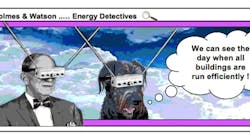Watson: There seems to be a lot in the news about Global Warming, Greenhouse Gas Emissions and Sustainability, the short and long term impacts on our Planet and the need to reduce the contributors. But I was curious about the hazards associated with energy production and consumption in 2014 and the role of energy consumed by buildings.
I did some research and was surprised to find that according to the U.S. Energy Information Administration, in the United States, the Building Sector consumes nearly half (47.6%) of all energy and Seventy-five percent (74.9%) of all the electricity produced. Globally, these percentages are even greater.
Holmes: What did you find out about the hazards associated with energy production and consumption?
Watson: The numbers are staggering. The World Health Organization estimates that there were about 3.7 million deaths from outdoor air pollution in 2012, of which nearly 90 percent were in developing countries. Coal particulates pollution alone is estimated to shorten approximately 1,000,000 lives annually worldwide, including nearly 24,000 lives a year in the United States.
It’s not just coal either; of the ten most polluted countries, almost all of the worst offenders are either major oil and gas producers, or emerging economies that are growing rapidly.
Holmes: That’s almost beyond comprehension isn’t it? And as more energy is required to satisfy the increasing demands of developing countries, those numbers will continue to increase.
Watson: I’ve been thinking about something Holmes. We have known for a long time and now we are reading that more and more people agree that up to 30% of the energy consumed by most buildings is wasted. Simply tuning up the energy systems and operating them properly on a continuing basis can reduce that waste and the associated hazards.
Since I saw those statistics I now realize that more people die every minute of every single day of the year from energy wasted in buildings than die in airplanes in a year.
Holmes: You’re right Watson. Our profession has a tremendous opportunity and I think obligation to make a real difference, not only for the future but right now. But how can we do it?
Watson: I think we should model ourselves after the airline industry. As we quoted in a recent blog, “In the last five years, the death risk for passengers in the United States has been one in 45 million flights, according to Arnold Barnett, a professor of statistics at M.I.T. In other words, flying has become so reliable that a traveler could fly every day for an average of 123,000 years before being in a fatal crash, he said.”
What makes flying so safe?
Holmes: Airplanes use instrumentation and information and very smart monitoring and control systems to keep all systems running at peak efficiency. And there are very strict quality control policies and procedures for everyone involved with designing, installing, operating and maintaining those systems. There are checks and balances and continuous training to ensure that they are followed and everything is done right, every single time.
Watson: But as we know, in buildings there is little use of instrumentation and information, a lack of standards, policies and procedures for those who design, install, operate and maintain those systems, and essentially no checks and balances.
It seems pretty simple to me; just design and operate buildings like airplanes.
Holmes: I think you’ve got a great solution Watson. Reducing the energy used in buildings will literally save and improve the quality of millions of lives.
Watson: You know Holmes, my brother is a famous doctor; you may have heard of him, Dogtor Watson. But I am realizing that I may have the opportunity as an Energy Professional to improve the health and extend the lives of as many or more people than he will.
Holmes: It’s a huge and global problem. We can’t just isolate ourselves from the rest of the world anymore. All of the emissions from all of the mining and all of the new factories and new power plants being built in China and India and in all developing countries go into the earth’s atmosphere, their atmosphere, our atmosphere. An atmospheric monitoring station in Steamboat Springs in the mountains of northern Colorado has picked up Mercury from coal burning power plants in China.
As George Carlin asked about swimming pools, “Do you want the peeing or non-peeing section?” Today we can ask, “Do we want to breathe the polluted or the non-polluted section of the atmosphere?”
Watson: We’re all on the same Planet and we need to work together to preserve it. Minimizing the energy wasted in buildings through conservation is certainly the cheapest, fastest and best way to make a tremendous contribution.
Tell us about your experiences, both good and bad with energy professionals, what has worked and what hasn’t. Send us your comments, thoughts and suggestions on how to improve our profession so we can all continue to learn from each other. Thanks – Holmes & Watson.
